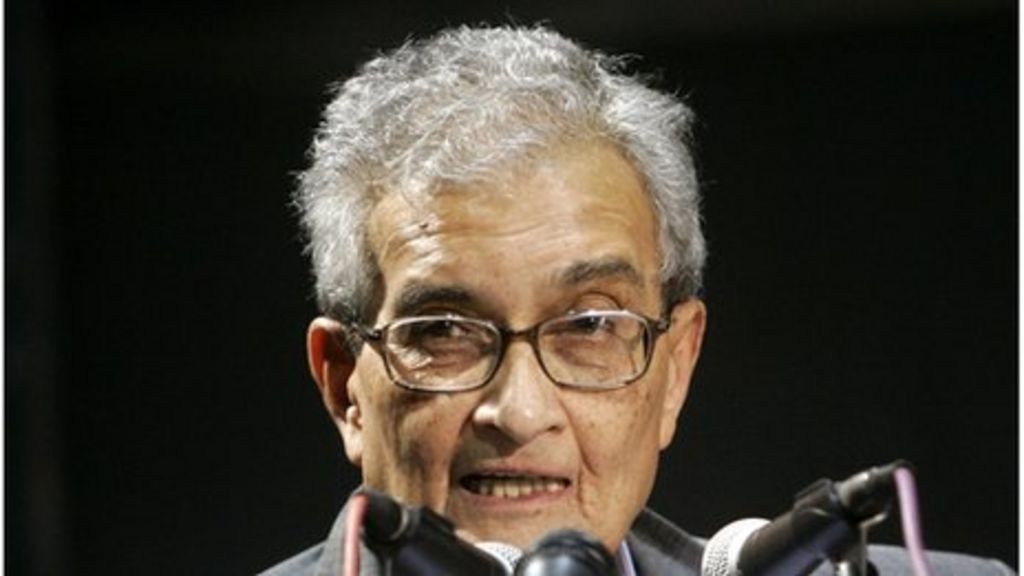


In a recent interview, Nobel laureate Amartya Sen stated that the results of the recent Lok Sabha polls show that India is not a 'Hindu Rashtra'. He also expressed disappointment in the practice of keeping people in jail without trial, which has continued since the days of British rule and has escalated under the current BJP government. Sen called for a change in this practice and urged for a politically open-minded approach, stating that the idea of a Hindu Rashtra is not appropriate for a secular country like India.
The Idea of 'Hindu Rashtra': A Contested Concept
The concept of 'Hindu Rashtra' has been a contentious issue in Indian politics for decades. Proponents of a Hindu Rashtra believe that India should be an exclusively Hindu nation, where non-Hindus would have limited rights or even be excluded from the political and social mainstream. Opponents argue that such a concept is incompatible with India's secular constitution and would lead to religious discrimination and division.
Recent Developments
In a recent interview, Nobel laureate Amartya Sen expressed disappointment with the trend towards a Hindu Rashtra in India. He cited the results of the recent Lok Sabha polls as evidence of this shift, as well as the increasing practice of keeping people in jail without trial, which he said has escalated under the current BJP government. Sen called for a change in this practice and urged for a politically open-minded approach, stating that the idea of a Hindu Rashtra is not appropriate for a secular country like India.
Background
The idea of a Hindu Rashtra gained prominence in the early 20th century during the Indian independence movement. It was promoted by leaders such as Vinayak Damodar Savarkar and Keshav Baliram Hedgewar, who founded the Rashtriya Swayamsevak Sangh (RSS), a Hindu nationalist organization. The RSS played a significant role in the Indian independence struggle but was later banned by the government for its alleged involvement in communal violence.
After independence, the RSS and other Hindu nationalist groups continued to advocate for a Hindu Rashtra. They argued that India was a Hindu nation and that non-Hindus should be relegated to a subordinate status. This ideology was rejected by the Indian constitution, which declared India a secular state and guaranteed equal rights to all citizens regardless of religion.
Top 5 FAQs and Answers
1. What is the definition of a Hindu Rashtra?
A Hindu Rashtra is a concept that proposes India to be an exclusively Hindu nation, where non-Hindus would have limited rights or even be excluded from the political and social mainstream.
2. Is India a Hindu Rashtra?
No, India is not a Hindu Rashtra. India is a secular state as per its constitution, which guarantees equal rights to all citizens regardless of religion.
3. What are the potential consequences of a Hindu Rashtra?
A Hindu Rashtra could lead to religious discrimination, communal violence, and the erosion of civil liberties for non-Hindus. It would also undermine India's secular constitution and its commitment to pluralism and tolerance.
4. Why is Amartya Sen concerned about the trend towards a Hindu Rashtra?
Sen believes that the idea of a Hindu Rashtra is incompatible with India's secular constitution and would lead to religious discrimination and division. He has also expressed concern about the increasing practice of keeping people in jail without trial, which he says has escalated under the current BJP government.
5. What can be done to counter the trend towards a Hindu Rashtra?
To counter the trend towards a Hindu Rashtra, it is important to promote religious tolerance, pluralism, and the rule of law. The government should uphold the values enshrined in the constitution and protect the rights of all citizens, regardless of religion.

In a strongly worded statement, politician Shashi Tharoor expressed his opposition to the VB-G RAM G Bill that aims to replace MNREGA. Tharoor argued that the removal of Mahatma Gandhi's name from the scheme goes against its core values and also criticized other proposed changes such as financial alterations and a shift of responsibility to states. The politician believes that the Bill poses a threat to the principles of federalism and that the scheme should not be made subject to executive notification.

Union Minister Shivraj Singh Chouhan introduced the Viksit Bharat - Guarantee for Rozgar and Ajeevika Mission (Gramin): VB-G RAM G Bill, 2025 in the Lok Sabha. The bill aims to establish a new rural development framework aligned with the national vision of Viksit Bharat @2047 and seeks to provide a statutory guarantee of 125 days of wage employment to each rural household. The government is determined to pass the bill in this parliamentary session and failure to do so could complicate budgetary provisions.

In a significant move to improve academic standards, India's new Viksit Bharat Adhishthan Bill, 2025, places student feedback at the heart of higher education accreditation. Union Education Minister Dharmendra Pradhan, citing the National Education Policy 2020, announced that for the first time, students will have a direct impact on accreditation outcomes. The new framework will also increase institutional autonomy and encourage innovation, but with a strong emphasis on accountability through transparent student-led evaluations. The consolidation of regulators and accreditation bodies aims to streamline and strengthen the quality of higher education in India.

On the occasion of Vijay Diwas, a day commemorating India's 1971 victory over Pakistan, Rahul Gandhi, Leader of Opposition in Lok Sabha, paid his respects to the brave soldiers who showed indomitable courage, leading to the liberation of East Pakistan and the formation of Bangladesh. The date also marks the surrender of 93,000 Pakistani soldiers to the Indian Armed Forces and is a tribute to the bravery and sacrifice of Indian soldiers. Congress National President Mallikarjun Kharge also highlighted the 1971 victory as a great example of humanity and justice under the leadership of then Prime Minister Indira Gandhi.

Senior Congress leaders respond to Delhi court's refusal to take ED's chargesheet in the National Herald-Young Indian case, emphasizing the lack of evidence and foundation of the case. They accuse the BJP of exaggeration and targeting the opposition, claiming that the ruling has validated their long-held belief that the case is politically motivated. Congress leader Abhishek Manu Singhvi highlights the legality and commonality of corporate restructuring, while Congress general secretary K.C. Venugopal condemns the Modi government's targeting of Sonia Gandhi and Rahul Gandhi without any legal basis.

The Congress party declared a moral and legal triumph after the Delhi court dismissed the Enforcement Directorate's chargesheet in the National Herald-Young Indian case. The judge noted that the chargesheet was based on a private complaint rather than an FIR, making it legally inadmissible. The Congress accused the Modi government of maliciously targeting its leaders and misusing central agencies for political gain. They vowed to continue fighting for truth and democratic rights, asserting that nothing could deter them from their mission.

India commemorates Vijay Diwas every year on December 16 to honour the soldiers who sacrificed their lives during the 1971 war with Pakistan, which resulted in the creation of Bangladesh. As part of this year's celebrations, the Indian Army displayed a reconstructed Turkish armed drone, Yiiha, which was shot down by India during Operation Sindoor on May 10. The Kamikaze class of drones, also known as "suicide drones," were used by Pakistan to target Indian military and civilian installations, but were almost all destroyed by the Indian military.

India celebrates the 54th Vijay Diwas, honoring the bravery and sacrifice of its soldiers in the 1971 war that led to the liberation of Bangladesh. Political leaders, including Prime Minister Narendra Modi and President Droupadi Murmu, pay glowing tributes to the armed forces and their unmatched courage. The Army marks the occasion by recalling the historic triumph and the flawless coordination between different branches of the military, with an impressive Military Tattoo in Kolkata.

Renowned spiritual leader and former BJP MP, Ram Vilas Vedanti, passed away at the age of 67 due to a heart attack. Known for his significant role in the Ram Janmabhoomi movement, Vedanti had been admitted to a hospital in Rewa for a blood infection and low blood pressure. Attempts to transport him to a better medical facility were unsuccessful due to bad weather. Political leaders, including Uttar Pradesh Chief Minister Yogi Adityanath, expressed their condolences and praised Vedanti's contributions to society.

Indian Ambassador to the United Nations, Harish P, slammed Pakistan for misusing international platforms for its hostile agenda against India at the UNSC Open Debate on “Leadership for Peace”. He objected to Pakistan’s reference to Jammu and Kashmir and questioned its democratic credentials while reaffirming India’s stance on cross-border terrorism. This reflects the ongoing strain in India-Pakistan relations and New Delhi’s determination to counter any attempt by Islamabad to internationalise bilateral disputes.